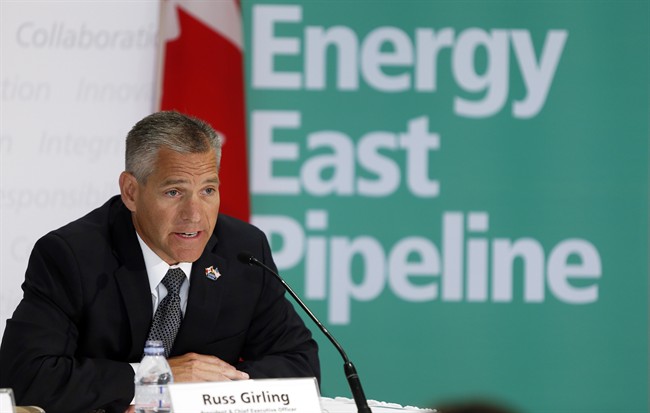FREDERICTON – When it comes to people like Cyrille Simard, TransCanada has a challenge in selling the Energy East Pipeline project in New Brunswick.

The mayor of Edmundston says he wants the company to guarantee the west-to-east pipeline, which could traverse his city of 16,000, won’t harm the area’s watershed.
“They gave us the assurance that it was understood that it is a very important issue and that they would take care of that by bringing some new scenarios of a route,” Simard says.
“We’re still waiting for that, and we’ll see.”
As TransCanada wraps up a round of open houses in the province this week to promote the project, it has a sense of the concerns communities have with the $12-billion development, which would see oil shipped from Alberta to the Irving Oil refinery and a proposed export terminal in Saint John.
Simard says TransCanada proposed one route that would venture near residential neighbourhoods, a plan he does not support. He said city council won’t give its approval to the project until it is assured the local water supply is protected.
A spokesman for TransCanada said the company’s engineers are contacting the City of Edmundston to look into Simard’s concerns.
“It is something that we’re addressing,” said Phillip Cannon.
Cannon said most of the people who have attended the open houses have been examining the proposed route map and want compensation if the route disrupts farming or tree lots during construction. Landowners are being paid to allow surveyors onto their property and the company is negotiating compensation with people if construction of the pipeline disrupts their land, he said.
He said TransCanada is also working to assure residents that pipelines are the safest way to transport large quantities of oil.
“People have to know that lines are equipped with shutoff valves, that we have a control centre in Calgary and all the lines are monitored 24/7,” he said.
“If there was a drop in pressure in any line, one of our experts there can shut it down in a matter of minutes and isolate the section that is problematic.”
Cannon said many people at the open houses inquire about employment prospects, though details on the number of jobs building the project would generate have yet to be worked out.
“We are still working on the economic study that we’ll be rolling out soon where people can get a better idea of more specific jobs by province,” Cannon said.
Cannon said more formal public hearings will be scheduled after the company files an application with the National Energy Board to proceed with the development near the end of this year or early in 2014.
The Energy East pipeline project, which still has to clear regulatory reviews, would deliver up to 1.1 million barrels per day from Alberta to Quebec in late 2017. A 1,400-kilometre extension would be built to ship oil to Saint John a year later.



Comments